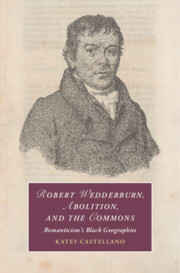Book contents
- Robert Wedderburn, Abolition, and the Commons
- Cambridge Studies in Romanticism
- Robert Wedderburn, Abolition, and the Commons
- Copyright page
- Contents
- Figures
- Acknowledgments
- Introduction
- Chapter 1 Against Private Property
- Chapter 2 From Plantation to Prison
- Chapter 3 Black Women’s Abolitionist Geographies in The Horrors of Slavery and The History of Mary Prince
- Chapter 4 Provisions and Pigs
- Chapter 5 Maroon Settlements as Abolitionist Commons
- Chapter 6 Emancipation as the Enclosure of “Waste Fertility”
- Conclusion
- Notes
- Bibliography
- Index
- Cambridge Studies In Romanticism
Chapter 2 - From Plantation to Prison
Wedderburn’s The Horrors of Slavery and London’s Radical Press
Published online by Cambridge University Press: 09 January 2025
- Robert Wedderburn, Abolition, and the Commons
- Cambridge Studies in Romanticism
- Robert Wedderburn, Abolition, and the Commons
- Copyright page
- Contents
- Figures
- Acknowledgments
- Introduction
- Chapter 1 Against Private Property
- Chapter 2 From Plantation to Prison
- Chapter 3 Black Women’s Abolitionist Geographies in The Horrors of Slavery and The History of Mary Prince
- Chapter 4 Provisions and Pigs
- Chapter 5 Maroon Settlements as Abolitionist Commons
- Chapter 6 Emancipation as the Enclosure of “Waste Fertility”
- Conclusion
- Notes
- Bibliography
- Index
- Cambridge Studies In Romanticism
Summary
Wedderburn’s view of Black-led abolition was further outlined in his life narrative, Horrors of Slavery. The narrative initially emerged as a series of letters to a working-class periodical, Bell’s Life in London, after the editor had questioned whether plantation owners ever enslaved their own mixed-race children. The question prompted Wedderburn to share his life story, in which he represented himself as a “product” of plantation slavery and testified to his father’s moral depravity as a “slave-dealer.” Although the letters prompted threatening replies from his half-brother, Andrew Colvile, Wedderburn republished the Bell’s Life letters as a pamphlet that was sold by ultra-radical booksellers in London. Horrors radically tracked Wedderburn’s life from slavery on a Jamaican plantation to his harsh sentence of solitary confinement in an English prison for blasphemous libel, making it an essential supplement to more commonly studied Romantic-era slave narratives, such as Equiano’s Interesting Narrative.
Keywords
- Type
- Chapter
- Information
- Robert Wedderburn, Abolition, and the CommonsRomanticism's Black Geographies, pp. 45 - 62Publisher: Cambridge University PressPrint publication year: 2025

